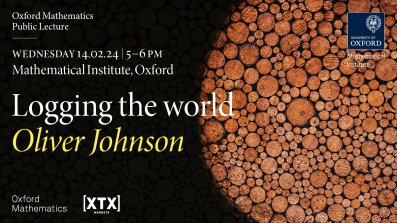16:00
Traces of random matrices over F_q, and short character sums
Abstract
17:00
Logging the World - Oliver Johnson
During the pandemic, you may have seen graphs of data plotted on strange-looking (logarithmic) scales. Oliver will explain some of the basics and history of logarithms, and show why they are a natural tool to represent numbers ranging from COVID data to Instagram followers. In fact, we’ll see how logarithms can even help us understand information itself in a mathematical way.
Oliver Johnson is Professor of Information Theory in the School of Mathematics at the University of Bristol. His research involves randomness and uncertainty, and includes collaborations with engineers, biologists and computer scientists. During the pandemic he became a commentator on the daily COVID numbers, through his Twitter account and through appearances on Radio 4 and articles for the Spectator. He is the author of the book Numbercrunch (2023), which is designed to help a general audience understand the value of maths as a toolkit for making sense of the world.
Please email @email to register.
The lecture will be broadcast on the Oxford Mathematics YouTube Channel on Wednesday 06 March at 5-6pm and any time after (no need to register for the online version).
The Oxford Mathematics Public Lectures are generously supported by XTX Markets.

16:00
A new approach to modularity
Abstract
In the 1960's Langlands proposed a generalisation of Class Field Theory. I will review this and describe a new approach using the trace formua as well as some analytic arguments reminiscent of those used in the classical case. In more concrete terms the problem is to prove general modularity theorems, and I will explain the progress I have made on this problem.
16:00
Tangent spaces of Schubert varieties
Abstract
Schubert varieties in (twisted) affine Grassmannians and their singularities are of interest to arithmetic geometers because they model the étale local structure of the special fiber of Shimura varieties. In this talk, I will discuss a proof of a conjecture of Haines-Richarz classifying the smooth locus of Schubert varieties, generalizing a classical result of Evens-Mirkovic. The main input is to obtain a lower bound for the tangent space at a point of the Schubert variety which arises from considering certain smooth curves passing through it. In the second part of the talk, I will explain how in many cases, we can prove this bound is actually sharp, and discuss some applications to Shimura varieties. This is based on joint work with Pappas and Kisin-Pappas.


